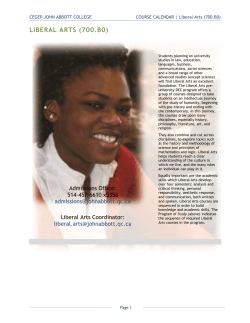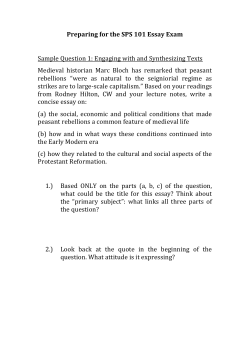
Liberal Humanism And the Liberal Humanist Subject
Liberal Humanism And the Liberal Humanist Subject Liberal Humanism’s Philosophical Roots • Liberal-humanist philosophical thought contributes to modern beliefs in a reality that can be known directly through the senses and through the employment of rational thought. • Liberal humanism inspired a scientific, rational world view that placed the knowing individual at the center of history, and viewed that history as the progress of Western thought. • It served as the catalyst for the modern world’s reliance on individualism and belief in a common human nature, scientific rationality, and the search for truth as universal knowledge and certainty in the world. • Of the many schools of thought inspired by liberal humanism, two directly inform modern reading practices: empiricism and rationalism. • Though Western empiricism finds its earliest inspiration in Aristotle, it took its modern form following the great 17th- and early 18th-century British thinkers Locke, Berkeley, and Hume. • Empiricism posits that all factual knowledge is based on our sensual experience and inner reflection -- that is, there is a reality independent of the mind that can be experienced by Liberal Humanism’s Philosophical Roots • And while different schools of empiricist thought interpret key terms such as experience, fact, and world differently, they generally hold that the mind comes to acquire knowledge about the world by systematic means including induction and the scientific method. • Rationalism, a school of thought with its early Western roots in the dialogues of Plato, claims as its modern proponents the 17th- and 18th-century philosophers Descartes, Spinoza, and Leibniz. • Rationalism is characterized by the belief that knowledge of the world can be attained through reason, that this knowledge is universal and deductive in character, and that everything is fundamentally explainable by this universal system. • This view of the world, while at odds with certain fundamental tenets of empiricism, finds its greatest expression in the fields of logic and mathematics. The Modern Self • Before the Renaissance, Western society defined the self by its location within both a "secular and divine order." • The center of pre-modern epistemology was "the great chain of being," in which all members of society had a proper place. • With the rise of Renaissance humanism and the Enlightenment, however, the individual began to be conceived as sovereign and epistemologically central • This reconfiguration of the self, spurred by historical events such as the Protestant Reformation and the scientific revolution, ultimately led to the systematic examination of the modern self. Although many participated, four of the more influential theorists were Immanuel Kant, Rene Descartes, and John Locke The Modern Self • Kant asserted that the definitive characteristic of the human self was its capacity for reason. • Reason allowed the self to understand and order the world with certainty. According to Kant, "[R]eason is the faculty which supplies the principles of a priori knowledge," and "pure a priori principles are indispensable for the possibility of experience, . . . [f]or whence could experience derive its certainty, if all the rules, according to which it proceeds, were always themselves empirical, and therefore contingent?" • Defining humans by their capacity for a priori reasoning reveals that the essence of the Kantian self is individual and imperviousness to experience (i.e., static). • Kant deduced further that this self he envisioned was unitary • Proceeding from the notion of a unitary self or selfconsciousness governed by a capacity for reason that is unaffected by the particularities of experience, Kant felt that "pure reason" both enabled and compelled humans to construct a "transcendental philosophy" that articulated the structure and order of the experiential world. • Locke shared with Kant the belief that humans were essentially individualistic and defined by their capacity for reason. Beliefs of Liberal Humanism • General • • • • Absolute Truth The world can be controlled and ordered We can picture and represent the world Belief in linear progress • Universal • Universality means text must be studied in isolation (context, personal ideologies) • Human nature is unchanging • People's individuality (personality) is transcendent • Purpose = humanist enhancement of life Liberal Humanist Subject • the notion that we have a more or less stable self-concept. • The idea that we have a more or less stable and coherent Self (often referred to as the 'Cartesian self' - after the 17th century French philosopher, Descartes) • This Cartesian, liberated and autonomous subject is in charge of him/herself and engages (or at least is capable of engaging) in rational debate with other subjects to arrive at a consensus. • This conception of the self or subject is fundamental to humanism and underlies, for example, the typical understanding of liberal democracy. Liberal Humanist Subject • understanding of the self as somehow having a uniquely individual core, somehow sheltered from cultural forces. • the modernist notion of the individual self, with individual rights, including the right to selffulfilment, self-realization, 'the pursuit of happiness', the right to property, the right to self-expression, to the 'free and full development of his personality’ Individualism • a political and social philosophy that emphasizes • individual liberty • belief in the primary importance of the individual and in the virtues of self-reliance and personal independence • embraces opposition to authority and to all manner of controls over the individual, especially when exercised by the state or society • Is directly opposed to collectivism, but it can exist in a community where individuals respect other individuals • may derive from a belief in solipsism and is often confused with egoism. Three conceptions of the self • as suggested by Stuart Hall 1. the Enlightenment subject, the highly individualist Cartesian subject, with some kind of essential, stable centre or core. 2. the sociological subject, this conception of the self, while still adhering to the notion of an inner or core self, examined how the self was shaped and developed by significant others, reference groups and so on, and is of course central to any understanding of the notion of socialization. 3. the post-modern subject, which is often referred to as the decentered subject, in which there is no stable 'core' identity; if there appears to be then that is only because of the 'narrative of the self' which we have constructed and such narratives are themselves the product of social intercourse.
© Copyright 2025




















